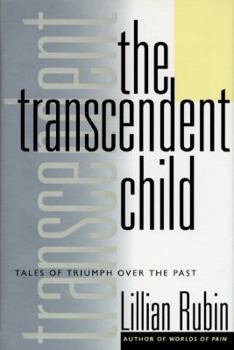The Transcendent Child: Overcoming Painful Pasts
Select Format
Select Condition 
Book Overview
How is it that some people can transcend even the most harsh and painful past? For the answer, Dr. Rubin turns to the life stories of adults who were scarred by the worst kinds of family and social... This description may be from another edition of this product.
Format:Hardcover
Language:English
ISBN:0465086691
ISBN13:9780465086696
Release Date:March 1996
Publisher:Basic Books
Length:240 Pages
Weight:0.99 lbs.
Dimensions:1.0" x 5.8" x 8.5"
Customer Reviews
2 ratings
Lillian Rubin strikes again
Published by Thriftbooks.com User , 18 years ago
I admit it, I am a Lillian Rubin fan. I reviewed her book on relationships, "Intimate Strangers," a year or so ago. The latter was a sort of, "why does he leave the toilet seat up," gossip about her patients (she's a shrink; like most shrinks, she lacks a normal person's ability for self-insight, and compensates as best she can with analysis), combined with a boast as to how well trained her hubby was. This book, I found in a pile of discards in my apartment building. Charming stories of people who underwent the most cruel torments in childhood, whether via neglectful parents, abusive parents, poor parents, rich parents, sexually abusive parents or whatever, yet managed to become relatively well-adjusted adults. Being a bit of a narcissist, Rubin shamelessly compares the struggles of these pathetic creatures to her own practically nonexistant childhood dissapointments, to great comic effect. Some of the "patients" struck me as exaggerators, or fabricators looking for sympathy. Others were certainly remarkable in their abilities to recoup from a horrid background. Rubin does deserve credit for conveying their emotional turmoil in a skillful manner, and the occasional unintentional low comedic moments make it charming toilet reading. I don't know what other people would read a book like this for. I read such things for the exact same reason I like to watch Brazilian Soap Operas, or read icky crime books. Such things are a sort of medieval passion play, or a horror movie, made real. Maybe if, like the other reviewer, I had a bad childhood, these stories would tell me I am not alone, and that, if these other people survived, so can I. But, frankly, I didn't have a terrible childhood. Most people haven't. Most people who will read the book haven't had a bad childhood. These certainly are not "how to" stories. The people who overcame more or less seemed to do so by being stronger on their insides than most people are. So, while perhaps inspiring (I found them more horrifying than inspiring), they're not going to show you the way out of the box.
How to overcome a painful childhood
Published by Thriftbooks.com User , 25 years ago
Each chapter is the true story of a child who endured terrible physical, emotional, and/or sexual abuse, yet managed to grow into an adult capable of working, loving, giving, and enjoying. Many of the abuses are so horrific, and the stories and characters are so well-drawn, that it is impossible not to weep for these children, or to be awed by their heroic strength. I found the last chapter particularly interesting and useful: it is a list and description of the characteristics these resilient children had in common. Learning and applying these characteristics, even as an adult, can give individual suffering some meaning and lead to a happier life. I have given this book to my friends who continue to struggle against the effects of terrible childhoods. Recognizing themselves in the book is healing in and of itself. My friends and I are grateful to Ms. Rubin for this helpful work.






